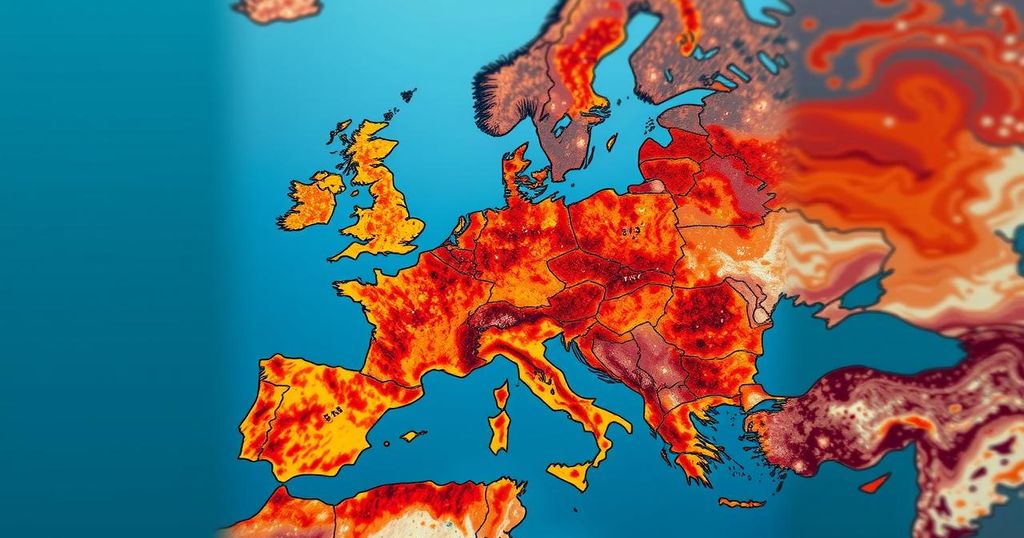Climate Crisis Linked to Over Half of Heat Deaths in Europe in 2022

A study by the Barcelona Institute for Global Health reveals that climate change was responsible for over half of the 68,000 heat deaths in Europe during the summer of 2022. This research highlights the urgent public health implications of climate change, estimating that 38,000 lives could have been saved without human-induced warming. Disproportionate impacts were noted among women, older adults, and southern Europeans. Health experts advocate for immediate action to mitigate the severe effects of extreme heat.
A recent study conducted by researchers at the Barcelona Institute for Global Health (ISGlobal) reveals that climate change was responsible for over half of the 68,000 heat-related deaths during the extreme summer of 2022 in Europe. Specifically, an estimated 38,000 lives could have been saved had human-induced greenhouse gas emissions not worsened the heatwaves. This death toll starkly contrasts the number of homicides in Europe that year, highlighting the severe impact of climate change on public health. Thessa Beck, the lead author of the study, asserts, “Many see climate change as a future concern. Yet our findings underscore that it is already a pressing issue.” The research indicates that the effects of climate change disproportionately affected demographics, with higher fatalities among women, older individuals, and southern Europeans than their northern counterparts. It was previously established that carbon emissions significantly intensified heatwaves; however, this study quantifies the human toll, estimating that approximately 56% of heat-related deaths in 2022 were preventable if human activity had not contributed to global warming. This figure represents an increase in mortality from previous years, which ranged from 44% to 54% between 2016 and 2021. Moreover, experts warn that Europe is warming at an accelerated rate twice that of the global average, with hospitals ill-equipped to manage the health repercussions. Rising temperatures may soon lead to greater morbidity from heat than recovery from colder winters. United Nations projections indicate the planet could warm by 3 degrees Celsius by the century’s end unless mitigation steps are taken. The dangers associated with extreme heat are compounded in regions such as Africa and Asia, where insufficient data hampers health impact studies. The study’s methodology encompassed evaluating health data across 35 European nations and modeling potential scenarios devoid of anthropogenic climate change. Results indicated that women accounted for 22,501 heat-related deaths while men contributed 14,026. Critics, including Garyfallos Konstantinoudis from Imperial College London, caution that the study may overstate the heat’s mortality impact, noting advancements in public health and infrastructure that could reduce heat-related fatalities over time. To mitigate such risks, health professionals recommend hydration, avoiding strenuous outdoor activities during peak temperatures, and aiding vulnerable populations. Governmental action plans could further enhance public safety, advocating for urban green spaces and measures to reduce pollution. Beck emphasized, “Heat can be very dangerous for the heart, especially for older people,” underscoring the urgent need for comprehensive strategies to address this crisis.
This article discusses a pivotal study that links climate change to heat-related fatalities in Europe, particularly during the summer of 2022. With a staggering number of deaths attributed to extreme heat, this research sheds light on the urgent public health risks posed by climate change. The article underlines varying levels of mortality across different demographics and emphasizes the challenge faced by healthcare systems to cope with rising temperatures. In the context of ongoing climate discussions, the findings serve as a critical reminder of the mortality consequences of inaction on climate issues.
The findings of the study underscore the immediate and severe consequences of climate change on public health in Europe, particularly manifested through heat-related mortality. With over half of the heat deaths linked directly to human-induced climate change, immediate action is necessary to mitigate further loss of life. Strategies such as improving healthcare preparedness, designing urban environments that promote resilience, and significantly reducing emissions are crucial. The research compellingly calls for recognition of climate change as a current crisis rather than a distant concern, demanding both personal and governmental action to protect the population from extreme heat impacts.
Original Source: www.theguardian.com






